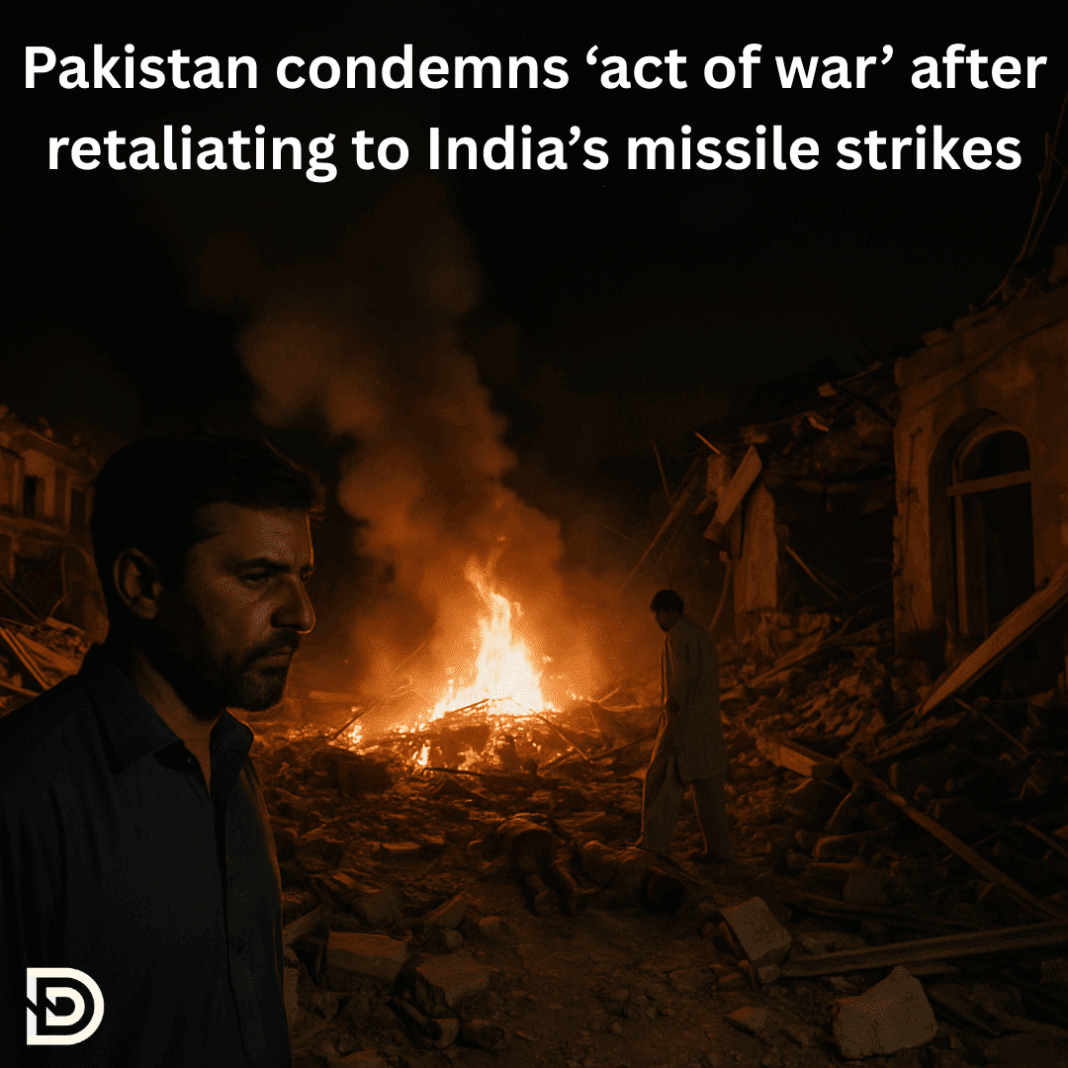Following India’s deadly missile attack early on Wednesday, tensions between India and Pakistan have significantly increased.
India launched strikes on what it described as “terrorist infrastructure” in Pakistan, killing at least eight people, including a toddler, and injuring over 35 more. The Indian military claimed these targets were involved in attacks against Indian civilians, including a deadly strike last month in Indian Kashmir that killed 26 Hindu tourists.
In response, Pakistan strongly condemned the missile strikes, calling them an “act of war.” It claimed that five Indian Air Force jets had been shot down. The government of Pakistan released a firm statement, saying, “Pakistan gives a befitting reply to India.” The situation has brought the two nuclear-armed countries dangerously close to open conflict.
One of the Indian missiles struck a mosque in Bahawalpur, located in Punjab, Pakistan’s most populated province. A man and a woman were hurt in this incident, and a kid was killed. Other missiles reportedly hit areas near Muridke and Kotli, including parts of Pakistan-administered Kashmir. Loud explosions were heard in Muzaffarabad, the capital of Pakistani Kashmir, with power outages reported after the blasts.
Meanwhile, in Indian-administered Kashmir, residents of Kupwara district reported heavy gunfire and artillery shelling. Three Indian civilians were confirmed dead, and five others were injured in cross-border firing. Along the strongly guarded Line of Control, which separates India and Pakistan and separates Kashmir, Indian and Pakistani troops engaged in gunfire.
Water as Leverage: A New Escalation in India-Pakistan Relations
Pakistan’s Response and National Reaction
Pakistan’s Prime Minister Shehbaz Sharif called the Indian missile strikes an unprovoked and hostile act. He declared, “Pakistan has every right to respond forcefully to this act of war imposed by India, and a forceful response is being given.” He also stated that Pakistan’s military and citizens were prepared to defend the country. A meeting of the national security committee was scheduled for Wednesday morning to discuss the developments.
Pakistan’s Defence Minister Khawaja Asif claimed that none of the sites hit were military facilities. He told reporters that at least six of the Indian missiles hit civilian areas. He further said, “We are in the process of retaliating. Pakistan’s retaliation will be visible before the morning.
Videos and photos shared on social media showed graphic scenes of destruction. One widely circulated video showed a massive explosion lighting up the night sky. In another image, the bloody body of a young child and a badly injured adult were seen lying on hospital stretchers. These visuals sparked outrage across Pakistan and further fueled the national anger.
Pakistan’s Foreign Ministry stated that the Indian missiles were launched while remaining within Indian airspace but targeted locations across the international border and the Line of Control. The Ministry described the strike as “a reckless escalation” that endangered civilian lives and interfered with commercial air operations.
Ceasefire Violated as Pakistan Opens Fire Along LoC Hours Before Indian Army Chief’s Srinagar Visit
Major airlines announced the suspension of flights over parts of northern India and Pakistan until midday on Wednesday due to safety concerns in the region.
India’s Justification and Ongoing Shelling
India justified the missile strikes by saying they were in response to the attack on Hindu tourists in the Baisaran Valley, a popular destination in Pahalgam, Kashmir. “We are upholding the commitment that those responsible for this attack will be held accountable,” the Indian Defense Ministry stated.
The strikes targeted “terrorist infrastructure in Pakistan and Pakistan-occupied Jammu and Kashmir,” the Indian Army said in a statement. Their efforts were “focused, measured, and non-escalatory,” the army said. India also emphasized that no Pakistani military buildings were targeted, suggesting that it had taken care to avoid triggering a wider conflict.
However, Pakistan denied these claims. It maintained that the strikes hit civilian areas and not any terrorist sites. The cross-border exchange of fire has continued since April 24, with nightly gunfire reported from both sides of the border.
Hours before the missile assaults, Indian Prime Minister Narendra Modi delivered a forceful speech. He discussed halting the water flow over India’s borders and proposed that India now retain the water that previously entered Pakistan. Although Modi did not specifically mention Pakistan in his speech, it followed India’s suspension of its involvement in the 65-year-old Indus Waters Treaty.
Pakistan reacted strongly to the water remarks, calling any interference with river flows an “act of war.” The treaty is crucial for Pakistan’s drinking water and farming.
The United Nations expressed concern over the developments. “He calls for maximum military restraint from both countries,” a UN spokesperson for Secretary-General António Guterres stated. A military conflict between India and Pakistan is not something the world can afford.
For now, both nations remain on high alert, as their long-standing rivalry enters another tense and deadly chapter.

